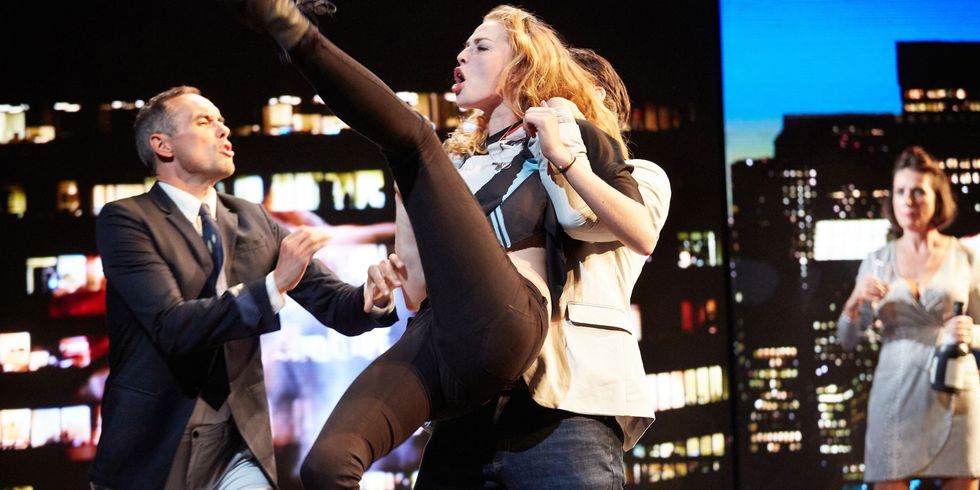Freya Mavor got rave reviews for her role as Annie, a twenty-something New York drug addict who feels trapped by life, in Good Canary directed by John Malkovich.
But one recurring compliment was for her perfect cartwheels - which she performs during a frantic scene of drug-fueled spring cleaning.
The 23-year-old actress who has no formal training but spent two years playing Mini McGuinness in E4's Skins - which she refers to as 'her little drama school' - always wanted to act on stage.
So when the meaty and complex role of Annie in Zach Helm's play Good Canary came up, she literally pounced, getting the part after only two auditions.
Next up, she's back on screen playing a young Charlotte Rampling in the BBC adaptation of the Julian Barnes novel The Sense of an Ending.
ELLE caught up with the actress for an exclusive interview about what it's like being (directed by) John Malkovich.
What's surprised you most about working with John Malkovich?
The thing that's really shocked me, and I think a lot of the other actors who are a lot more experienced than me too, is that he's incredibly generous and free with his direction.
If you ask him how does he direct us, he would say, 'I just let them do their thing. I allow them to just take it and make it their own'.
So he doesn't do things like blocking, which means that on a certain line I should be standing up and going to the window and on a different line I should be sat back down.
He's even said, 'If you want to do this whole scene lying on your back screaming then do it, if you want to do this other scene with your back to the audience, that's fine.'
What's he taught you about theatre?
The thing he says about theatre, in comparison to film, is that with theatre (and I think that's what drives him and interests him most) is that it's a living thing.
You have to be there to witness it and if you weren't there, then it doesn't exist for you.
That's what happens every night, this thing is created and then it disappears.
With film, it can be beautiful, but it remains as one thing and it will be forever that thing and once it's set, that's its course, its life and its existence.
Theatre is created in the moment and that's what is so powerful and exciting about it.
Your character suffers from mental health illnesses and addiction, how did you research the role?
I looked at things that dealt with relationships that were toxic, in the sense that there's an outer force making it toxic.
I watched films like Sid & Nancy which deals with the messy portrayal of addiction and desire, and Candy with Heath Ledger, again about a couple who are both drug addicts and her decline into mental instability.
I also watched the documentary about Amy Winehouse; I guess these sorts of people who are amazing personalities but suffer burnouts.
Did you speak to any friends about the issues Annie faces?
The thing that's quite amazing about this is everyone seems to relate to it to on some level because they themselves have been affected by anxiety or depression or they know someone who has been.
I know people, either in my past, or friends of friends and I've seen the kind of deterioration caused by mental health issues and addiction.
Has the role changed your view on mental health issues?
I'm quite an optimistic person but unfortunately for my character she doesn't want to help herself because she has so little sense of the value of her life, and of her own worth.
With Annie, it's really sad because she's so acutely aware and fiercely smart but she has no interest in removing all these substances from her life because she doesn't want to live with herself, which makes you really appreciate mental health and depression.
It puts all that into a very empathetic light; the day to day struggles are a very real thing for a lot of people and I think lots of people get dismissed because of a misunderstanding of what depression or anxiety or all these things really mean.
Where does the Good Canary fit in?
In one version of the play, the good canary is a reference to the song by Liz Phair.
The lyrics of that song are very much about having to conform to another person's image of how they want you to be.
There's also this idea that we keep birds in cages against their own nature.
So there's the cage metaphor but there's also something about the canary singing; it sings because it's the only thing it knows how to do, it can't do anything else.
It is bizarre, this idea of keeping something in a cage when it shouldn't be, and it being pretty when it's singing for you and being an accessory to your life.
That's the message we're trying to convey.
Good Canary is on at The Rose Theatre until 8 October; www.rosetheatrekingston.org















